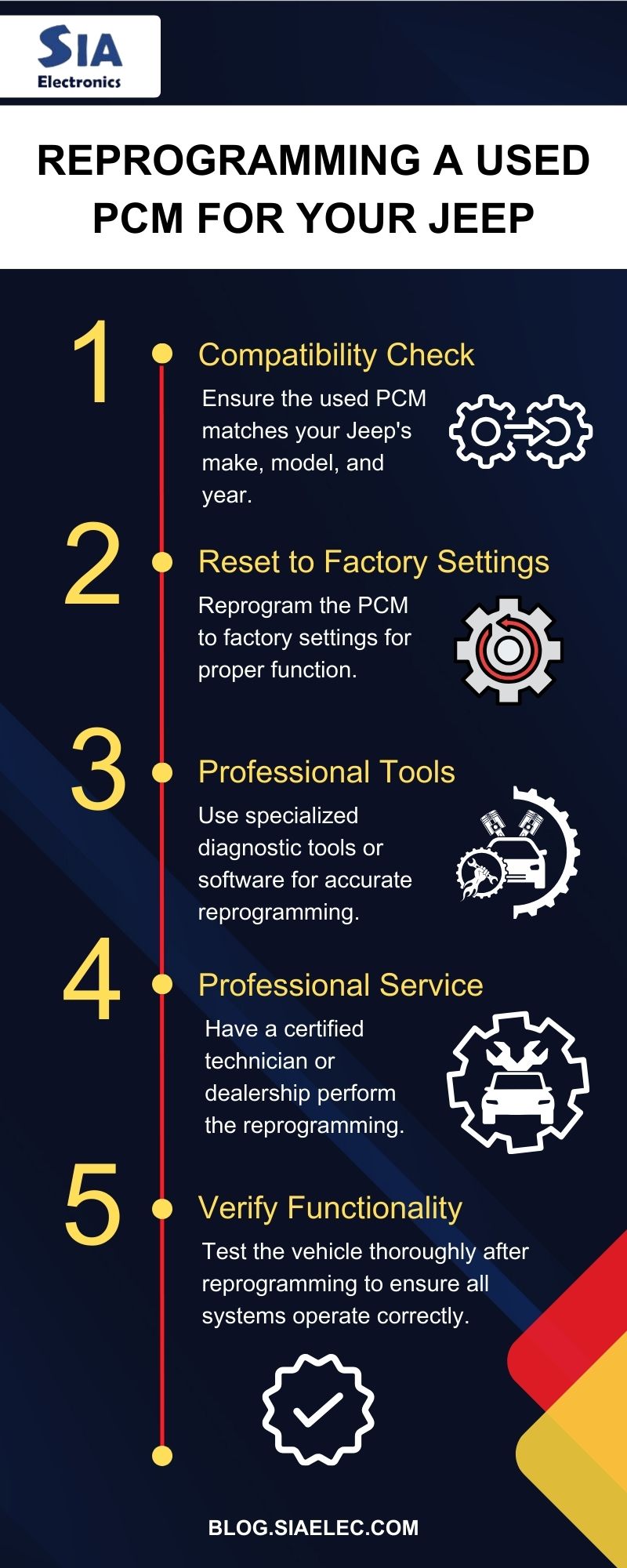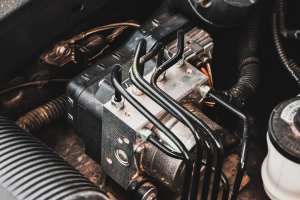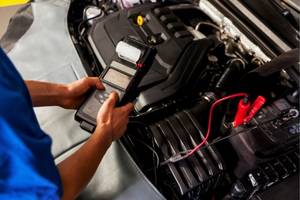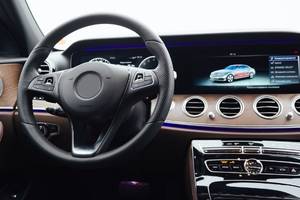Introduction
The Powertrain Control Module (PCM) is a crucial component in the Jeep Grand Cherokee’s operation, serving as the brain of the vehicle's engine and transmission systems. With its role in managing performance, efficiency, and emissions, understanding the PCM's functions and maintenance is essential for Jeep Grand Cherokee owners. In this blog, we'll delve into what is powertrain control module in jeep grand cherokee , where it's located, and how to deal with issues related to it. Additionally, we’ll address common questions to help you manage your Jeep Grand Cherokee more effectively.
Table of Contents
What is the Powertrain Control Module (PCM) in a Jeep Grand Cherokee?
The Powertrain Control Module (PCM) in a Jeep Grand Cherokee is an integrated computer system responsible for controlling various aspects of the engine and transmission. It combines the functions of the Engine Control Module (ECM) and the Transmission Control Module (TCM) into a single unit. Here’s what the PCM does:
- Engine Management: Monitors and adjusts engine parameters such as fuel injection, ignition timing, and air-fuel mixture to optimize performance and fuel efficiency.
- Transmission Control: Regulates shifting patterns and transmission performance based on driving conditions and engine load.
- Emissions Control: Ensures that the vehicle meets emissions standards by controlling components like the catalytic converter and EGR valve.
- Diagnostics: Provides error codes and diagnostic information for troubleshooting issues with the engine or transmission.
The PCM uses sensors to gather data about various engine and transmission parameters, processes this data, and adjusts the vehicle's systems accordingly.
Where is the PCM located in a Jeep Grand Cherokee?
In a Jeep Grand Cherokee, the PCM is typically located in the engine compartment. Its exact location may vary depending on the model year and engine configuration. Here’s a general guide to finding it:
- Engine Bay: The PCM is usually mounted on or near the firewall, often on the passenger side of the engine bay. It is housed in a protective metal or plastic enclosure.
- Underhood Fuse Box: In some models, the PCM may be located near the underhood fuse box, making it accessible for maintenance and replacement.
- Check the Owner’s Manual: For specific locations and diagrams, refer to the Jeep Grand Cherokee owner’s manual, which provides detailed information for your particular model.
Can I reprogram a used PCM for my Jeep Grand Cherokee?
Reprogramming a used PCM for your Jeep Grand Cherokee is possible, but it requires specialized equipment and expertise. Here’s what you need to know:
- Compatibility: The used PCM must be compatible with your Jeep Grand Cherokee’s model year and engine configuration. Using an incompatible PCM can cause performance issues or even damage.
- Reprogramming Process: Professional automotive technicians use specialized diagnostic tools and software to reprogram the PCM. This process involves updating the PCM with the correct software and calibration for your vehicle.
- Professional Assistance: It’s recommended to have a certified technician handle the reprogramming to ensure accuracy and prevent potential problems.
SIA Electronics, with over 20 years of experience, provides re-manufacturing and reprogramming services for automotive electronic control modules, including PCMs. Their expertise ensures that the used PCM will be properly reprogrammed and calibrated for your Jeep Grand Cherokee.
How do I reset the PCM in my Jeep Grand Cherokee?
Resetting the PCM in a Jeep Grand Cherokee can help resolve issues related to performance or diagnostic trouble codes. Here’s a step-by-step guide:
- Disconnect the Battery: Turn off the vehicle and disconnect the negative battery terminal. This will cut power to the PCM and allow it to reset.
- Wait: Leave the battery disconnected for about 15-30 minutes. This ensures that any residual power is discharged, and the PCM is fully reset.
- Reconnect the Battery: Reconnect the negative battery terminal and ensure it is securely fastened.
- Start the Engine: Start the engine and allow it to idle for a few minutes. The PCM will recalibrate itself and adapt to the engine’s current condition.
If the issue persists after resetting the PCM, it may indicate a more serious problem requiring professional diagnostics.
Can I drive my Jeep Grand Cherokee with a faulty PCM?
Driving a Jeep Grand Cherokee with a faulty PCM is not advisable. Here’s why:
- Performance Issues: A faulty PCM can cause erratic engine performance, poor fuel efficiency, and difficulty shifting gears.
- Emissions Problems: The PCM is responsible for managing emissions control. A malfunctioning PCM can result in increased emissions and potential failure of emissions tests.
- Safety Risks: Depending on the severity of the PCM issue, you may experience loss of power or control, which can be dangerous while driving.
If you suspect that your PCM is faulty, it’s important to have it inspected and repaired by a professional as soon as possible to avoid further damage and ensure your vehicle operates safely and efficiently.
Conclusion
The Powertrain Control Module (PCM) plays a vital role in the performance and reliability of your Jeep Grand Cherokee. Understanding its functions, location, and maintenance can help you keep your vehicle running smoothly. Whether you need to reprogram a used PCM, reset the current one, or address a faulty PCM, knowing the key steps and seeking professional assistance when needed will ensure that your Jeep Grand Cherokee remains in top condition.
SIA Electronics offers expert services in re-manufacturing and reprogramming automotive electronic control modules, including PCMs, with over 20 years of industry experience. Their expertise ensures that your Jeep Grand Cherokee’s PCM is in capable hands.
FAQs on
Powertrain Control Module in Jeep Grand Cherokee : The Ultimate Guide for 2024
-
1. What are the symptoms of a faulty PCM in a Jeep Grand Cherokee?
Ans.
Symptoms may include poor engine performance, difficulty shifting gears, decreased fuel efficiency, and illuminated check engine light. If you experience these issues, it’s important to have the PCM checked by a professional.
-
2. How often should the PCM be serviced or checked?
Ans.
Regular maintenance and diagnostic checks are recommended to ensure the PCM is functioning correctly. If you notice any performance issues or warning lights, it’s a good idea to have the PCM inspected.
-
3. Can I replace the PCM myself?
Ans.
While it is possible to replace the PCM yourself, it is recommended to have a professional technician handle the replacement and reprogramming to ensure compatibility and proper functioning.
-
4. How much does it cost to reprogram a PCM?
Ans.
The cost of reprogramming a PCM can vary depending on the vehicle and the extent of the work required. It’s best to consult with a professional service provider for an accurate estimate.
-
5. What should I do if my PCM fails after installation?
Ans.
If the PCM fails after installation, contact the service provider for assistance. They may offer warranty coverage or troubleshooting support to resolve the issue.
-
6. Can a faulty PCM cause transmission problems?
Ans.
Yes, since the PCM controls transmission functions, a faulty PCM can lead to transmission issues such as erratic shifting or slipping. It’s important to address PCM problems promptly to avoid transmission damage.



